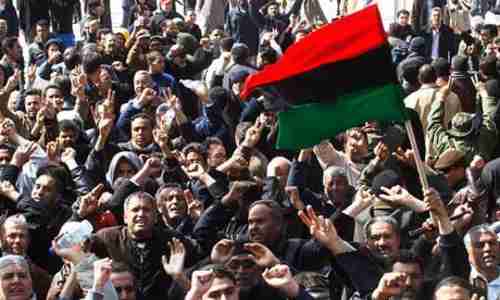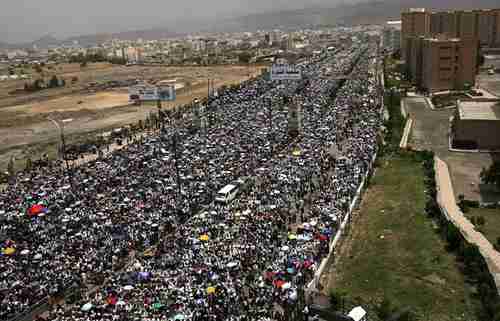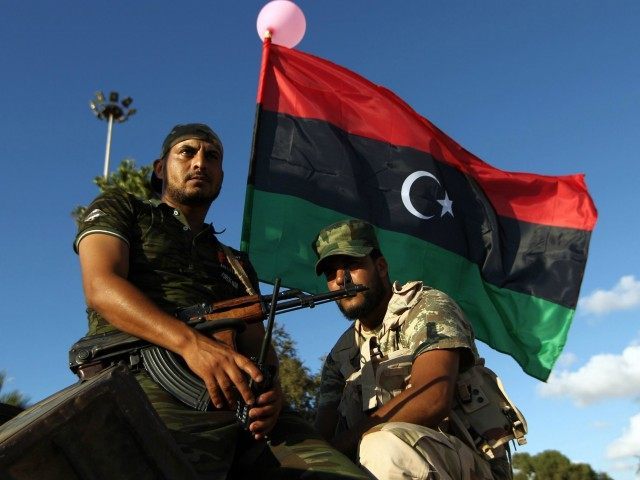This morning’s key headlines from GenerationalDynamics.com
- Italy debates military intervention in Libya after ISIS kills Italian hostages
- Looking back at the 2011 ‘Arab Spring’ Libya military intervention
- Russian media calls Gaddafi’s Libya an ‘oasis of stability’
- Police in Turkey use force to shut down opposition newspaper
Italy debates military intervention in Libya after ISIS kills Italian hostages

A 14-Mar-2011 picture in the Guardian of Libyan protesters, with the caption, ‘Even if Gaddafi does succeed in quelling the Libyan uprising, it will be no more than a temporary setback for the wider Arab revolution.’ (Reuters)
Two Italian construction workers among four that have been held hostage by the so-called Islamic State (IS or ISIS or ISIL or Daesh) in Libya last July, and have been held ever since, were killed on Wednesday in a gunfight. The other two hostages were freed within 48 hours. Local militias claimed credit for freeing the two during a raid.
The death of the two Italian hostages at the hands of ISIS has given added urgency to calls for Italy to intervene militarily in Libya. There have been discussions among Western nations — the US, Britain, France, and Italy — to intervene militarily to stop the growth of ISIS in Libya, and to prevent the capture of Libya’s oil fields by ISIS. Serious planning has been made on this military intervention since January.
For weeks, there have been increasingly alarmist headlines in Italy about imminent military action in Libya. Britain, France and possibly America have already sent dozens of special forces to Libya, and John Phillips, the US ambassador to Italy, said in an interview, “Italy has made a commitment to provide in the range of 5,000 troops” as part of an international force to stop ISIS. American warplanes have been bombing ISIS targets in Libya. ( “20-Feb-16 World View — US warplanes strike suspected ISIS training base in Libya”)
A military intervention in Libya is a particularly sensitive subject in Italy because Libya was a former colony of Italy, and there are still many personal and familial ties between the two countries. Furthermore, Italy has for five years been the recipient of a flood of refugees fleeing across the Mediterranean from Libya.
The plans for an international military intervention in Libya were always contingent on approval by a unity government in Libya. There are two governments in Libya, an internationally recognized government in the east, headquartered in Tobruk, and a rebel government in the west, headquartered in Tripoli.
So a full-scale military intervention has not gone ahead because the two governments have refused to approve the military intervention. And indeed, Khalifa Haftar, the head of the government in Tobruk, scored a victory against ISIS in Benghazi this week, and is claiming that his forces can defeat ISIS with no outside military intervention.
Haftar’s confidence does not quell the fears of Westerners that before long ISIS is going to achieve a point of no return in taking control of Libya’s “oil crescent” in the Sirte basin south of Benghazi, with billions of barrels of oil of estimated reserve. At that point, ISIS will be sufficiently entrenched that it would be much harder to dislodge than it would be now, and it would more easily allow ISIS to use as a launching pad for terrorist attacks on Europe. . AP and Reuters and AFP and Bloomberg and Guardian (14-Mar-2011)
Looking back at the 2011 ‘Arab Spring’ Libya military intervention

The Arab Spring in Sanaa Yemen in 2011 (AFP)
A web site reader commented on one of my articles accusing America of causing the Syrian and European refugee crisis by its decision to bomb Libya in 2011. It is a bizarre accusation, based on the usual technique of starting by making up facts that fit the agenda.
As it turns out, I’m in a good position to evaluate this claim, since I was writing about the Arab Spring in 2011 almost every day. So I went back to read all the articles I had written in the first months of 2011 to see what happened.
What’s clear is that the accusation is completely backwards. It wasn’t American bombing of Libya that caused the refugee crisis. The refugee crisis was already in full swing when the bombing began. It was the refugee crisis that brought about the American bombing and the Libyan military intervention in 2011.
This trip back through time turned out to be pretty fascinating, because the events of that time were so incredible. The “Arab Spring” was one of the major generational events since WW II, and it is actually still going on if you count the wars in Syria, Iraq and Yemen.
Here’s a summary of what happened:
- Jan: Triggered by the death of a Tunisian food vendor, there were massive protests and gun battles in Tunisia, forcing the president to flee the country. There were violent protests in Egypt, and there were anti-government demonstrations in Yemen. There were fears that instability would continue to spread. Lebanon’s government collapsed.
- Jan: There were worldwide food riots as food prices reached historic highs. Egypt’s stock market crashed, and economic instability spread to other countries.
- Feb: Egypt’s president Hosni Mubarak was forced to step down.
- Feb: Refugee crisis in Tunisia sends thousands of Tunisians across the Mediterranean Sea to Italy.
- Feb: Bloodbath in Libya spreads from Benghazi and Tobruk in the east to Tripoli in the west. Muammar Gaddafi threatens to kill protesters, and says he’ll crush any enemy.
- Mar: Mideast riots spread to Bangladesh and Oman. Saudi Arabia was locked down over ‘Days of Rage’. Bahrain uprising becomes explosive. Yemen fighting escalates.
- Mar: Massive refugee crisis in Libya, with hundreds of thousands of refugees pouring into neighboring countries. Anti-government rebels demand that US, Britain and Nato establish a no-fly zone.
- Mar: Arab League unanimously requests no-fly zone over Libya.
- Mar: Gaddafi declares war on protesters in Libya. Said that “the moment of truth had come” for Benghazi.
- Apr: In Syria, street protests that had been growing for weeks became explosive, after tens of thousands of Syrians poured out into the streets. At least 90 people were killed and dozens injured when Syrian security forces fired live bullets and teargas at the protesters.
The interesting thing is that the accusation that American bombing in Libya caused the refugee crisis is exactly backwards. The refugee crisis had already begun in Tunisia and Libya, with hundreds of thousands of people pouring into neighboring countries, and thousands crossing the Mediterranean to Italy. It was this refugee crisis that caused Libyans to demand a no-fly zone, and for the Arab League to do the same, after which the UN Security Council passed a resolution.
So the refugee crisis created the demand for the no-fly zone, and the bombing by the West. A lot of the motivation for the West to get involved was the fear of a flood of refugees crossing the Mediterranean, and they hoped to stop that. That didn’t work.
For those who would like to go into more detail, I’ve created a lengthy posting on the Generational Dynamics forum with pointers to all the original articles, along with some excerpts from many of them. The posting can be found on the Generational Dynamics forum
Russian media calls Gaddafi’s Libya an ‘oasis of stability’
The web site reader who posted the comment accusing American bombing in Libya of causing the Syria refugee crisis had an anti-American agenda, and was probably a paid Russian internet troll.
The commenter was parroting Russian state media as illustrated by this claim:
Five years after the brutal murder of Libya’s leader Muammar Gaddafi, the country that was once an oasis of regional stability now has two competing governments and is actively being colonized by Daesh terrorists as they seek to relocate their headquarters to Libya.
This “oasis of regional stability” had Gaddafi declaring war on peaceful protesters, forcing hundreds of thousands of refugees to flood into neighboring countries and across the Mediterranean. Sputnik News (Moscow)
Police in Turkey use force to shut down opposition newspaper
Freedom of the press in Turkey suffered a major blow on Friday when government forces used force to shut down Zaman, the major opposition newspaper. Police used water cannon and tear gas to disperse protesters as they stormed the Zaman offices in Istanbul. There are now more than 30 journalists behind bars in Turkey. BBC
KEYS: Generational Dynamics, Libya, Italy, Britain, France, Islamic State / of Iraq and Syria/Sham/the Levant, IS, ISIS, ISIL, Daesh, Khalifa Haftar, Tobruk, Benghazi, Tripoli, Russia, Arab Spring, tunisia, Egypt, Yemen, Syria, Hosni Mubarak, Mummar Gadaffi, Bangladesh, Oman, Saudi Arabia, Syria, Turkey, Zaman
Permanent web link to this article
Receive daily World View columns by e-mail

COMMENTS
Please let us know if you're having issues with commenting.